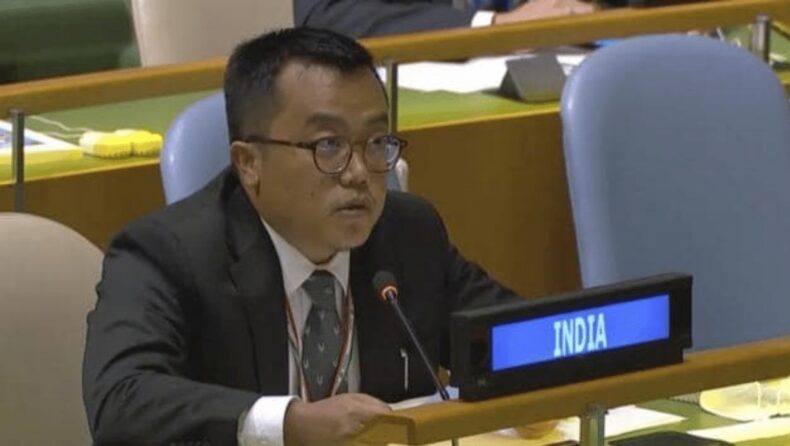India called out the hypocritical remarks of Pakistan Prime Minister Shehbaz Sharif at the UN General Assembly, stating that a country that “claims to seek peace with its neighbors” would never sponsor cross-border terrorism or provide shelter to terrorists.
“It is regrettable that the Prime Minister of Pakistan has chosen the platform of this august assembly to make false accusations against India,” said First Secretary Mijito Vinito, First Secretary of the Permanent Mission of India to the UN, in the “Right of Reply.”
A government that professes to want peace with its neighbors “would never fund cross-border terrorism, nor would it shield planners of the horrendous Mumbai terrorist attack, admitting their existence only under pressure from the international community,” Vinito continued.

The sharply worded reply by India was a response to Pakistan Prime Minister Shehbaz Sharif’s speech at the 77th UN General Assembly world leaders meeting where he accused India of violating the fourth Geneva convention in Jammu and Kashmir by registering “non-Kashmiri” voters to rig the elections.
Read More – At UN General Assembly Paris and Ankara Position themselves as Intermediaries in Russia’s Conflict
India used the “Right of Reply” to respond back to the remarks made by the PM of Pakistan. The exchange between India and Pakistan is always anticipated as Pakistan Prime Ministers at the UN General Assembly routinely bring up Jammu and Kasmir.
What is the “right of reply” that India used?
Member states are permitted to use their right to reply during the General Debate of the General Assembly in order to respond to criticism expressed. These are frequently caustic conversations that are typically had by a country’s representative at the UN.
In rebuttal, Mijito Vinito stated that PM Sharif brought up unfounded allegations to cover up wrongdoings in his own country and to justify acts against India that the world views as unacceptable.
Vinito said, “He has done so to obfuscate misdeeds in his own country and to justify actions against India that the world considers unacceptable.”
In his speech, Sharif underlined Pakistan’s desire for peace with India but emphasized a just and equitable resolution to the Kashmir conflict in accordance with the UN Charter and Security Council resolutions as it was the only way to “insure and guarantee” a permanent peace.

India has consistently upheld its determination to work with Pakistan to resolve the Jammu and Kashmir conflict on a bilateral basis and has shunned any outside interference.
India concluded its argument by stating that the Indian subcontinent had a genuine desire for peace, security, and growth, and it could be realized. Although that could only “happen when cross-border terrorism ceases,” “minorities are not persecuted” and the realities of the conditions are acknowledged by governments.
Pakistan uses “Right to Reply”
Pakistan also used its “Right to Reply” against the rebuttal by India, reiterating the points made in the speech by PM Sharif. It claimed that Indian diplomacy continues with “denial, deflection, and disinformation.”

The unsubstantive claims and accusations by Pakistan are a way to sully the image of India in the international forum. Pakistan has continually used the forum to level unfounded accusations against India to divert the attention of the international community from its own domestic polity.
Further comments by India on this are awaited. India is yet to make its speech at the General Assembly, which will be delivered by External Affairs Minister S Jaishankar. India’s calling out of the hypocritical remarks of Pakistan Prime Minister Shehbaz Sharif at the UN General Assembly was expected as Pakistan Prime Ministers routinely bring up Jammu and Kasmir issues at the international forum and continue to make unfounded accusations against India.













